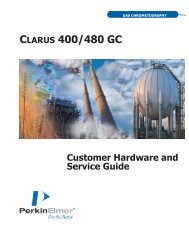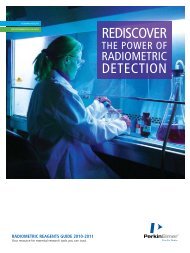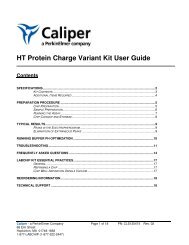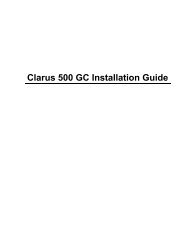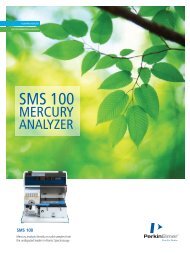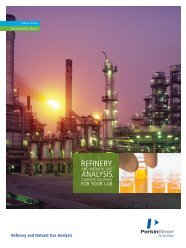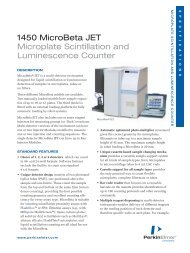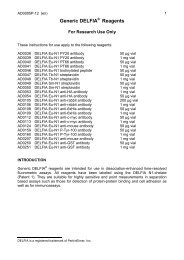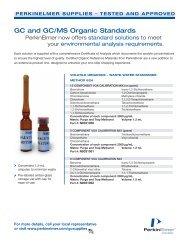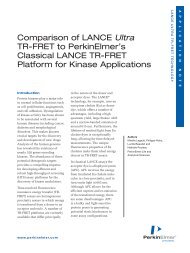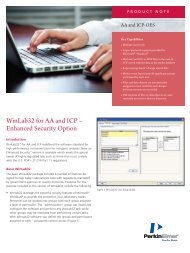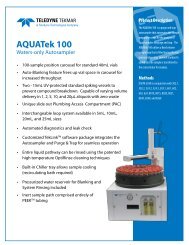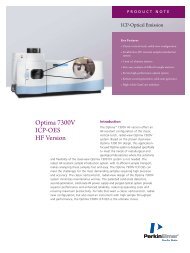ESI SC-FAST Sample Introduction Solutions for PerkinElmer ICP ...
ESI SC-FAST Sample Introduction Solutions for PerkinElmer ICP ...
ESI SC-FAST Sample Introduction Solutions for PerkinElmer ICP ...
You also want an ePaper? Increase the reach of your titles
YUMPU automatically turns print PDFs into web optimized ePapers that Google loves.
P R O D U C T N O T E<br />
<strong>ICP</strong>-OES and <strong>ICP</strong>-MS<br />
<strong>SC</strong>-<strong>FAST</strong> Benefits<br />
• Increases sample throughput 2-3 times<br />
• Minimizes sample uptake and washout time<br />
• Eliminates contact with peristaltic pump tubing<br />
• Provides full integration between <strong>SC</strong>-DX<br />
autosampler and <strong>SC</strong>-<strong>FAST</strong> technology<br />
• Ability to add Hg to <strong>ICP</strong>-MS methods without<br />
compromising throughput<br />
• Improved stability and reduced build-up on<br />
cones and lens system<br />
• No alteration to analytical measurement time<br />
• Reduced stabilization time<br />
<strong>ESI</strong> <strong>SC</strong>-<strong>FAST</strong> <strong>Sample</strong><br />
<strong>Introduction</strong> <strong>Solutions</strong><br />
<strong>for</strong> <strong>PerkinElmer</strong> <strong>ICP</strong>-<br />
OES and <strong>ICP</strong>-MS<br />
Systems<br />
<strong>PerkinElmer</strong>, Inc. has partnered with Elemental<br />
Scientific Inc. (<strong>ESI</strong>) to offer high-speed sample<br />
introduction technology to enhance the productivity<br />
of the industry-leading Optima <strong>ICP</strong>-OES as well as<br />
NexION ® and ELAN ® <strong>ICP</strong>-MS systems. The integrated<br />
systems offer a two to three time improvement in<br />
sample throughput <strong>for</strong> a wide variety of application<br />
requirements.<br />
<strong>PerkinElmer</strong> ® ’s atomic spectroscopy solutions have<br />
long been the systems of choice <strong>for</strong> labs with highthroughput<br />
needs because of their inherent highspeed<br />
capabilities, superior reliability and minimal<br />
maintenance.
When combined with the <strong>ESI</strong> <strong>SC</strong>-<strong>FAST</strong> systems, all instrument<br />
functionality is enhanced. <strong>Sample</strong> throughput is dramatically<br />
increased with no loss of detection limits. The combination<br />
of lower sample requirements and high-speed sample introduction<br />
systems reduce instrument operating time, argon<br />
consumption, and instrument maintenance which decreases<br />
overall cost of ownership and increases laboratory productivity.<br />
<strong>ESI</strong> <strong>SC</strong>-<strong>FAST</strong> technology<br />
<strong>ESI</strong>’s <strong>SC</strong>-<strong>FAST</strong> sample injection system was adapted to work<br />
with Optima <strong>ICP</strong>-OES as well as NexION and ELAN <strong>ICP</strong>-MS<br />
systems, allowing significant improvements in sample<br />
throughput speed. The solution is a combination of sample<br />
introduction hardware and software control of the timing<br />
parameters <strong>for</strong> the autosampler components.<br />
<strong>SC</strong>-<strong>FAST</strong> maximizes the productivity of Optima <strong>ICP</strong>-OES as<br />
well as NexION and ELAN <strong>ICP</strong>-MS instruments by reducing<br />
and optimizing all of the unnecessary steps involved in a<br />
sample acquisition. The system virtually eliminates sample<br />
uptake and wash times with no other alteration to the<br />
analytical method. <strong>Sample</strong> turnaround may be increased<br />
two to three fold by eliminating these analysis steps.<br />
The <strong>SC</strong>-<strong>FAST</strong> series autosampler includes a built-in vacuum<br />
pump <strong>for</strong> moving the solution from the test tube and filling<br />
a sample loop of a specific volume, so the sample never<br />
touches the pump tubing. Low volume valve technology<br />
minimizes contamination from carryover and reduces sample<br />
uptake and rinse-out time. See the comparison of the <strong>FAST</strong><br />
technique versus conventional sample introduction processes<br />
in Figure 2.<br />
Autosamplers <strong>for</strong> a Range of Sampling Needs:<br />
<strong>SC</strong>-2, <strong>SC</strong>-4, <strong>SC</strong>-8 and <strong>SC</strong>-14 DX Series<br />
The <strong>SC</strong>-DX series of autosamplers offers a variety of choices<br />
<strong>for</strong> laboratories with different sample and space requirements.<br />
<strong>SC</strong>-DX autosamplers can hold the widest range of both large<br />
standard racks and micro racks with vials ranging from 500 µL<br />
to 250 mL. The combination of dual-flow rinse stations and<br />
guide-free sample probes are proven to reduce blank<br />
contamination and sample carryovers.<br />
Figure 1. <strong>SC</strong>-<strong>FAST</strong> valve component.<br />
Figure 2. Comparison of a standard acquisition and <strong>SC</strong>-<strong>FAST</strong> sample<br />
introduction process.<br />
Figure 3. <strong>SC</strong>-2, <strong>SC</strong>-4, <strong>SC</strong>-8 and <strong>SC</strong>-14 DX autosampler offerings.<br />
2
Flexible and Robust<br />
The <strong>SC</strong>-DX autosampler models used with <strong>PerkinElmer</strong><br />
Optima <strong>ICP</strong>-OES as well as NexION and ELAN <strong>ICP</strong>-MS systems<br />
include the <strong>SC</strong>-2, <strong>SC</strong>-4, <strong>SC</strong>-8 and <strong>SC</strong>-14 DX. The systems<br />
have the flexibility to handle multiple rack options ranging<br />
from micro samples (less than 1 mL) to bottles (250 mL) in a<br />
single run. User-defined speed controls allow the autosampler<br />
to be tuned <strong>for</strong> each application and a wide variety of probe<br />
designs and custom racks are also available. The autosamplers<br />
have a simple mechanical design and have a PTFEcoated<br />
X and Z axis and sealed electronics to protect against<br />
harsh chemical environments.<br />
Ultraclean, Intelligent Autosamplers<br />
The <strong>SC</strong>-DX autosampler line maintains the integrity of the<br />
sample since vials are not exposed to overhead metal or<br />
mechanical parts. In addition, an all-fluoropolymer sample<br />
flow path ensures both acid and solvent resistancy. In addition,<br />
a dual-flow rinse station and a guide-free sample probe<br />
reduce blank contamination and sample carryovers.<br />
Accommodates a Variety of Capacities<br />
The <strong>SC</strong>-2 and <strong>SC</strong>-4 DX have a small footprint to maximize<br />
bench space while allowing up to 384 x 4 mL samples and<br />
576 x 4 mL, respectively. The <strong>SC</strong>-14 DX offers high sample<br />
capacity <strong>for</strong> long unattended or overnight runs with up<br />
to 1260 samples, 10 standards and dual-flow rinse.<br />
<strong>SC</strong>-<strong>FAST</strong> coupled with <strong>PerkinElmer</strong> <strong>ICP</strong>-MS <strong>for</strong> EPA<br />
Method 200.8<br />
The United States Environmental Protection Agency (U.S.<br />
EPA) Method 200.8 defines the procedure <strong>for</strong> measuring<br />
trace elements in water and soil/sediment samples by <strong>ICP</strong>-MS.<br />
The method lists five interferences (isobaric elemental,<br />
abundance sensitivity, isobaric polyatomic ion, physical and<br />
memory) which can affect the efficiency and accuracy of the<br />
analysis. Both the physical interferences and the memory<br />
interferences are highly affected by the type of sample<br />
introduction system used. The use of the <strong>SC</strong>-<strong>FAST</strong> 200.8<br />
rapid analysis system gives an average twofold improvement in<br />
the method detection limit (MDL) and reduces the memory<br />
interference, resulting in a doubling of the sample throughput.<br />
Table 1. Elements Measured in <strong>SC</strong>-<strong>FAST</strong> Rapid Analysis 200.8 Method.<br />
6<br />
Li<br />
44<br />
Ca<br />
59<br />
Co<br />
82<br />
Se<br />
121<br />
Sb<br />
209<br />
Bi<br />
9<br />
Be<br />
45<br />
Sc<br />
60<br />
Ni<br />
89<br />
Y<br />
137<br />
Ba<br />
232<br />
Th<br />
23<br />
Na<br />
51<br />
V<br />
65<br />
Cu<br />
98<br />
Mo<br />
165<br />
Ho<br />
238<br />
U<br />
24<br />
Mg<br />
52<br />
Cr<br />
66<br />
Zn<br />
107<br />
Ag<br />
202<br />
Hg<br />
27<br />
Al<br />
55<br />
Mn<br />
71<br />
Ga<br />
111<br />
Cd<br />
205<br />
Tl<br />
39><br />
K<br />
57<br />
Fe<br />
75<br />
As<br />
115<br />
In<br />
208<br />
Pb I.S.<br />
Table 2. Instrument Calibration Blank (ICB) Ran Immediately After<br />
5 µg/L Hg Calibration Standard.<br />
200<br />
Hg<br />
202<br />
Hg<br />
ICB 1 0.003 0.003<br />
ICB 2 -0.002 0.000<br />
ICB 3 0.001 0.003<br />
ICB 4 0.000 0.001<br />
ICB 5 -0.003 0.002<br />
Std. Dev. 0.0024 0.0013<br />
3 σ 0.007 ppb 0.004 ppb<br />
Ir used as I.S. <strong>for</strong> Hg calibration<br />
Table 3. Method Timings (seconds).<br />
Experimental Conditions Standard <strong>SC</strong>-<strong>FAST</strong><br />
<strong>Sample</strong> Uptake Delay 30 10<br />
<strong>Sample</strong> Stabilization 30 0<br />
<strong>Sample</strong> Reading 20 20<br />
Replicates 3 3<br />
<strong>Sample</strong> Wash 120 35<br />
Total Analysis Time 240 110<br />
A total of 33 elements were analyzed using the <strong>SC</strong>-<strong>FAST</strong><br />
rapid analysis 200.8 method in addition to 27 analytes and<br />
6 internal standards (Table 1) as compared to a standard<br />
sample introduction system <strong>for</strong> washout, method detection<br />
limits and sample throughput.<br />
www.perkinelmer.com
Uptake and washout<br />
It is important that the nebulizer used also has a low internal<br />
dead volume to ensure a rapid rise to steady-state signal<br />
and return to baseline signal. The time profiles in Figure 4<br />
show that the PFA-ST MicroFlow nebulizer has a much lower<br />
dead volume than a standard glass concentric nebulizer; the<br />
ST-nebulizer is integral to the improved per<strong>for</strong>mance of the<br />
<strong>SC</strong>-<strong>FAST</strong> 200.8 rapid analysis system.<br />
Blanks and detection limits<br />
The improved wash out (Figure 5) and reduced matrix loading<br />
of the <strong>ICP</strong>-MS using the <strong>SC</strong>-<strong>FAST</strong> results in improved method<br />
detection limits (MDLs) compared to the standard introduction<br />
system. With the <strong>SC</strong>-<strong>FAST</strong>, a rinse time of 30 seconds is<br />
sufficient to prevent sample carryover of the 5 µg/L Hg<br />
signal (Table 2). EPA Method 200.8 recommends a<br />
sample wash time of 120 seconds to rinse 5 µg/L of Hg<br />
from the previous sample be<strong>for</strong>e the next sample is analyzed<br />
(longer if gold is not added to the rinse solution).<br />
The combined <strong>SC</strong>-<strong>FAST</strong> benefits of rapid uptake and rinse<br />
out, excellent stability and reduced blanks and DLs improve<br />
the per<strong>for</strong>mance of EPA Method 200.8 while reducing time<br />
<strong>for</strong> individual sample analysis from 240 s to 110 s (Table 3).<br />
By reducing the sample uptake time and removing the peristaltic<br />
pumping, the <strong>SC</strong>-<strong>FAST</strong> lowers the total amount of sample<br />
matrix reaching the torch injector and <strong>ICP</strong>-MS cones 1 . The<br />
total sample load on the plasma is reduced by 57% (0.54 mL<br />
of sample using the <strong>SC</strong>-<strong>FAST</strong> compared to 1.25 mL with the<br />
standard introduction system) resulting in less matrix deposition<br />
on the injector and cones between samples, improving longterm<br />
stability and reducing maintenance.<br />
The reduced sample uptake and rinse times with the <strong>SC</strong>-<strong>FAST</strong><br />
mean the total sequence analysis time is more than halved.<br />
The improved efficiency in sampling means the cost of<br />
analysis is reduced with savings in argon and other <strong>ICP</strong>-MS<br />
consumables, giving the <strong>SC</strong>-<strong>FAST</strong> a rapid return on investment.<br />
Improvement in throughput <strong>for</strong><br />
biomonitoring samples using <strong>SC</strong>-<strong>FAST</strong><br />
A typical biomonitoring testing laboratory can have over<br />
10,000 samples to be analyzed on a monthly basis <strong>for</strong> a<br />
wide variety of diagnostic tests. In this example, a biomonitoring<br />
testing laboratory has 9 panels each with a different<br />
<strong>ICP</strong>-MS method (Table 4). The switch was made to the<br />
<strong>SC</strong>-<strong>FAST</strong> from standard introduction techniques to improve<br />
the laboratory’s throughput, without compromising accuracy<br />
or data quality.<br />
By reducing the uptake, stabilization and rinse times of an<br />
<strong>ICP</strong>-MS method, the <strong>SC</strong>-<strong>FAST</strong> can be used to reduce analysis<br />
times. Table 5 shows that all of the methods used were<br />
dramatically reduced by the <strong>SC</strong>-<strong>FAST</strong>, on average by over<br />
2½ times.<br />
With a daily load of 472 samples, standards, quality control<br />
standards and repeats to be run, the <strong>ICP</strong>-MS needs to be<br />
run <strong>for</strong> over 19 hours per day using standard introduction<br />
systems.<br />
By utilizing the <strong>SC</strong>-<strong>FAST</strong>, the same number of samples could<br />
be run in less than 8 hours, reducing running costs and possibly<br />
delivering same-day turnaround in results.<br />
<strong>SC</strong>-<strong>FAST</strong> Features<br />
• Multiple rack options ranging from micro samples to bottles<br />
• 6-way valve system <strong>for</strong> minimal uptake and wash times<br />
• Modular hardware components and identical electronics<br />
• User-defined speed controls<br />
• Wide variety of probe designs and custom racks available<br />
• Acid and solvent-resistant components<br />
• No probe guide <strong>for</strong> reduced cross contamination<br />
Table 4. Method Time Improvement Panel.<br />
Standard<br />
Panel Method Method Improvement<br />
Time (sec) Time (sec) Factor<br />
Panel 1 140 50 2.8<br />
Panel 2 158 61 2.6<br />
Panel 3 130 53 2.5<br />
Panel 4 134 58 2.3<br />
Panel 5 120 39 3.1<br />
Panel 6 142 49 2.9<br />
Panel 7 120 39 3.1<br />
Panel 8 158 59 2.7<br />
Panel 9 177 95 1.9<br />
Average Improvement: 2.6<br />
4
Table 5. Analysis Time Per Day.<br />
Average # Analysis Time Analysis Time<br />
Daily Analyses per <strong>Sample</strong> per Day<br />
<strong>Sample</strong>s, Curve,<br />
hh:mm:ss<br />
QC, Repeats Standard <strong>SC</strong>-<strong>FAST</strong> Standard <strong>SC</strong>-<strong>FAST</strong><br />
Panel 1 194 0:02:20 0:00:50 7:32:18 2:41:32<br />
Panel 2 88 0:02:38 0:01:01 3:50:55 1:29:09<br />
Panel 3 65 0:02:10 0:00:53 2:20:00 0:57:05<br />
Panel 4 15 0:02:14 0:00:58 0:33:31 0:14:31<br />
Panel 5 5 0:02:00 0:00:39 0:09:14 0:03:00<br />
Panel 6 5 0:02:22 0:00:49 0:10:55 0:03:46<br />
Panel 7 18 0:02:00 0:00:39 0:36:55 0:12:00<br />
Panel 8 14 0:02:38 0:00:59 0:36:28 0:13:37<br />
Panel 9 69 0:02:57 0:01:35 3:24:14 1:49:37<br />
Total 472 Total Hours/Day: 19:14:31 7:44:17<br />
Figure 4. <strong>SC</strong>-<strong>FAST</strong> injection profiles: PFA-ST vs. quartz concentric.<br />
Figure 5. <strong>SC</strong>-<strong>FAST</strong> vs. peristaltic pumped antimony flush-in and rinse-out.<br />
Specifications <strong>SC</strong>-2 DX <strong>SC</strong>-4 DX<br />
Communciations RS-232 with USB and IEEE-488 options; RS-232 with USB and IEEE-488 options;<br />
3 external switches In/Out, 3 drive switches In/Out 3 external switches In/Out, 3 drive switches In/Out<br />
Power requirements 100-240 VAC ±10%, 50-60 Hz 100-240 VAC ±10%, 50-60 Hz<br />
Standard positions 10 10<br />
Rinse positions 2 2<br />
Speed (sample to rinse) ~3 s ~3 s<br />
Number of racks 2 racks/180 samples 4 racks/360 samples<br />
Dimensions (H x W x D) 18 x 21 x 11.5 in. 18 x 31 x 11.5 in.<br />
Weight 18 lbs 33 lbs<br />
5
Specifications <strong>SC</strong>-8 DX <strong>SC</strong>-14 DX<br />
Communications RS-232 with USB and IEEE-488 options; RS-232 with USB and IEEE-488 options;<br />
3 external switches In/Out, 3 drive switches In/Out 3 external switches In/Out, 3 drive switches In/Out<br />
Power requirements 100-240 VAC ±10%, 50-60 Hz 100-240 VAC ±10%, 50-60 Hz<br />
Standard positions 10 10<br />
Rinse positions 2 2<br />
Speed (sample to rinse) ~3 s ~3 s<br />
Number of racks 8 racks/720 samples 14 racks/1260 samples<br />
Dimensions (H x W x D) 46 x 32 x 22 in. 45.5 x 21.5 x 44 in.<br />
Weight 90 lbs 100 lbs<br />
Polypropylene Tubes<br />
We offer a wide variety of high-quality, capped and uncapped autosampler tubes and supplies <strong>for</strong> your S10 Autosampler. Ranging in<br />
size from 8 mL to 50 mL, these tubes are available with either round or conical bottoms. Free-standing options are also available.*<br />
Autosampler Tubes with Caps<br />
Part No. Capacity Size Type Qty<br />
B0193233 15 mL 17 mm x 120 mm Conical Bottom 500<br />
B0193234 50 mL 28 mm x 115 mm Conical Bottom/Skirted 500<br />
Autosampler Tubes<br />
Part No. Capacity Size Type Qty<br />
N0777156 8 mL 13 mm x 100 mm Round Bottom 1200<br />
N0777167 15 mL 17 mm x 100 mm Round Bottom 1200<br />
N0777599 Plug <strong>for</strong> 15 mL Tubes (N0777167) 1200<br />
N9301205 16 mL 17 mm x 100 mm Round Bottom (Packs of 125) 1000<br />
N0777158 50 mL 30 mm x 115 mm Round Bottom (Bulk) 500<br />
Every day you count on <strong>PerkinElmer</strong> to provide you with solutions that deliver reliable per<strong>for</strong>mance, control operating costs and maximize operational<br />
time. Our complete portfolio of consumables, parts, supplies, training and service helps you meet both routine and demanding measurement challenges.<br />
We invest heavily in testing and validating our products to ensure you receive guaranteed compatibility and per<strong>for</strong>mance – on-time, <strong>for</strong> every instrument in<br />
your laboratory.<br />
For a complete listing of consumables and supplies, please visit www.perkinelmer.com/icpoessupplies<br />
<strong>PerkinElmer</strong>, Inc.<br />
940 Winter Street<br />
Waltham, MA 02451 USA<br />
P: (800) 762-4000 or<br />
(+1) 203-925-4602<br />
www.perkinelmer.com<br />
For a complete listing of our global offices, visit www.perkinelmer.com/ContactUs<br />
Copyright ©2009-2012, <strong>PerkinElmer</strong>, Inc. All rights reserved. <strong>PerkinElmer</strong> ® is a registered trademark of <strong>PerkinElmer</strong>, Inc. All other trademarks are the property of their respective owners.<br />
007975E_01



